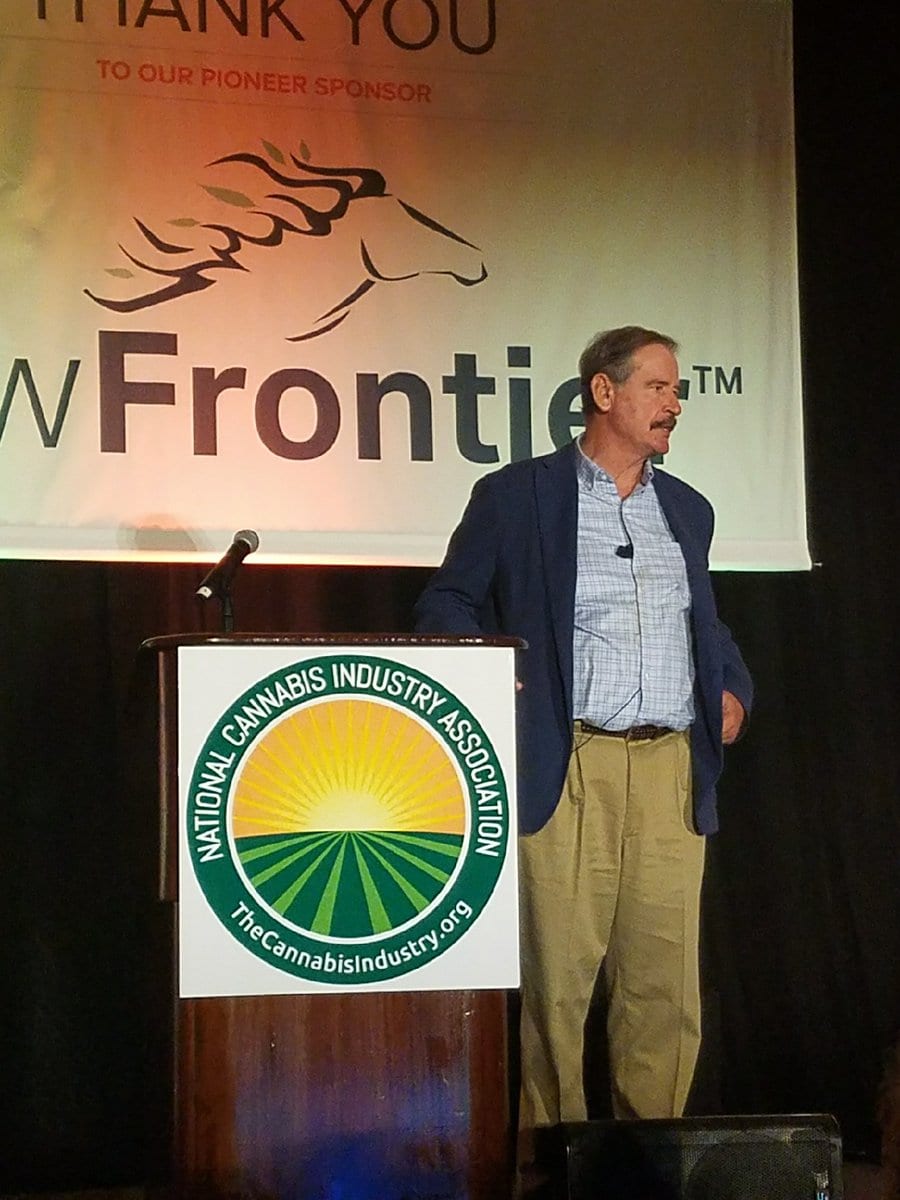Former Mexican President Fox Fires Up NCIA Crowd


By Beau Whitney, Senior Economist for New Frontier Data
Having attended this past week’s National Cannabis Industry Association (NCIA) Conference in Oakland, Calif., the most memorable takeaway was the speech given by the former Mexican president, Vicente Fox. While through my experience in the industry I have attended any number of cannabis industry-related events where politicians have spoken, this marked the first time I ever heard any former head of state come out so favorably in support of cannabis.
The speech was, predictably, partly political in nature. His opinion about President Trump has been pretty well carved out by this point, and Fox again pulled no punches in his criticism of either the president or his administration. But what was especially striking during this address was how effectively he presented the case for cannabis internationally.
In complimenting the NCIA attendees for their professionalism, and noting how much such conferences have evolved just within the past few years, Fox reinforced the importance of mature leadership amid this sector, and the need for demonstrating it by respecting the rule of law. His passionate rhetoric in this regard was what particularly engaged by his audience.
Fox recalled his experiences as president of Mexico, and described his country’s tragedies in having to cope with cartels and the illegal drug trade during his tenure. His solution, he explained, was to seek legalization both in Mexico and internationally, to cut off cartels’ access to any markets globally. He cited Portugal, specifically, as an example of legalization leading to positive economic results while conversely containing the breadth of violence and minimizing the human tragedies associated with illicit drugs. He also described how the movement toward legalization is taking hold in countries closer to Mexico, be it Uruguay or Canada and among the legal states in America.
In building his case for legal cannabis, Fox also advocated for cannabis to be included in the North American Free Trade Agreement (NAFTA). It is an interesting concept, as many international agreements would need to be reworked as cannabis legalization spreads worldwide. Based on research from New Frontier Data, inclusion into NAFTA would take some doing, such as adding it to the North America Industrialization Classification System (NAICS), but is not impossible.
Fox naturally did not miss promoting the Mexican market to the gathering. He cited statistics about how many agricultural products are imported to the United States from Mexico, which in 2016 surpassed Canada and the European Union to become the chief foreign supplier of agricultural products (19.9% of America’s agricultural market overall) to the United States, according to data from the US Department of Agriculture. Specifically, Fox spoke about the fact that 60% of all tomatoes purchased in the U.S. are from Mexico. He later shared his hopes that one day 60% of all cannabis purchased in the U.S. will come from Mexico, as well.
At present, such a day seems remote. As detailed in New Frontier Data’s “The Cannabis Industry Annual Report: 2017 Legal Marijuana Outlook” now available: “In April 2016 at the United Nations General Assembly Special Session (UNGASS) on the world drug problem in New York, President Enrique Peña Nieto pledged to revamp Mexico’s medical cannabis policies. On Dec. 13, 2016, the Mexican senate voted to legalize medical cannabis. The bill must still pass the lower Chamber of Deputies before it can be enacted into law, but it represents an important step toward establishment of a national medical cannabis framework.”
Regardless, “while Mexico is one of the largest producers of cannabis in the world, the majority of cannabis cultivated is ultimately illegally trafficked to more developed markets where consumers are wealthier and demand is higher… Still, there remains potential for investors and businesses interested in the emerging medical market opportunities, and for U.S. producers interested in exporting to Mexico. Indeed, some U.S. companies already have agreements in place to ship therapeutic cannabis oils and other cannabis -based medicine to Mexico to help treat children with severe forms of epilepsy.”
As I took in Fox’s speech, I reflected upon my own experiences in this industry, and took heart in the momentum which after the 2016 elections, especially, continues to be carried forward throughout the industry and investments. I took heart in how far things have come since 2014, when I first published a demand forecast in this space. Clearly the movement here in California is advancing at a breakneck pace, representing but a piece – OK, a big piece — of a massive movement gaining ever more momentum.
What once featured a conference room with a handful of people trying to figure out how to begin to navigate within the space of a new industry’s inchoate rules and regulations now boasts a ballroom full of people listening to a former foreign head of state now jumping on the bandwagon. It’s impossible not to share his optimism for how mature, mainstream, globally legalized cannabis markets may help shape free societies within even another short few years ahead.


Beau Whitney
Beau Whitney is the Senior Economist for New Frontier Data. Whitney has a unique blend of high tech business operations skills, economics and political analysis, as well as cannabis industry experiences.
While at Intel and TriQuint Semiconductor, Whitney honed his business operations skills associated with quickly ramping products from low volume to high volume. This is a skill he has since transferred to the cannabis industry. He is the former chief operations officer and compliance officer of one of the largest vertically integrated, publicly traded cannabis company in North America. His experiences incorporated growing, extraction, edible manufacturing and wholesale and retail distribution operations.
As an economic and policy analyst, his Whitney Economics white papers analyzing the cannabis market have been referenced in Forbes Magazine, USA Today, as well as in cannabis industry publications and across the Associated Press wire. Whitney has provided policy recommendations at the state and national levels and is considered an authority on cannabis economics.


